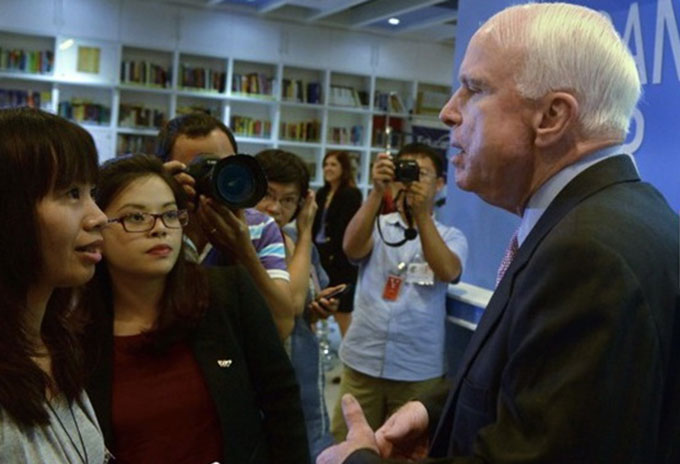Editor's Note: Dr. Terry F. Buss is a fellow of the U.S. National Academy of Public Administration. He wrote this article exclusively for Tuoi Tre News.
The United States imposed an embargo on lethal weapon sales to Vietnam in 1984, but now appears to be willing to provide the Vietnamese military with the arms it needs to modernize. The Vietnamese government has for years requested a lifting of the embargo. Visits in August by highly influential US leaders, including Senator John McCain and General Martin Dempsey, Chairman of the Joint Chiefs of Staff, send a positive signal the US is very likely to provide weapons.
The softening of the US position on arms sales likely resulted from the so-called Pivot to Asia launched by the Obama Administration some years ago. US and Vietnamese are concerned about Chinese incursions in the region. China is laying claim to islands - the Parasels and Spratlys - just off the coast of Vietnam, as well as contesting maritime claims made by Japan and the Philippines. But the US is also interested in expanding trade in the region - the Trans Pacific Partnership (TPP) - not just in improving security.
Senator McCain while in Vietnam strongly suggested that an arms agreement was possible as early as September 2014. In McCain’s view, the agreement would be phased in based on resolving some human rights issues of concern to the US. These issues seem to be manageable.
Congress must enact a law
Given the importance of the arms deal to the US and Vietnam, what is the process that must be followed to approve the deal?
The Congress must enact a new law amending a 1976 law, the “Arms Export Control Act (AECA),” that forbade arms sales to Vietnam and many other countries. President Obama has no authority to authorize an arms deal on his own.
To amend AECA, both houses of Congress, the House of Representatives and Senate, must separately prepare bills that indicate how the 1976 law will be amended to accommodate Vietnam.
Members from the House and Senate then meet in a conference committee to agree on the terms of the amendment. This amendment must receive a majority of the votes before it is sent to President Obama who can then either sign it into law or veto it. The Department of State implements the law and monitors any non-compliance with the terms of the law by the Vietnamese government. Congress can stop arms sales with a joint resolution of both houses if it suspects non-compliance issues.
The process of amending existing laws can take a few days or months depending on politics, competing legislation, and congressional elections (held this November). So, McCain’s prediction of a September deal is entirely possible.
Potential sticking points
So where are the possible sticking points? We can assume that since he has sent the highest ranking military officer in the US defense forces, Obama wants to support Vietnam’s request. The sustained efforts of Secretary of State, John Kerry, and Secretary of Defense Chuck Hagel in support of the Asian Pivot and Vietnam in particular also suggests that the US government will not be a problem.
The only possible hitch is that Obama is consumed not only with foreign policy crises in the Middle East, Africa and Ukraine, but also with racial tensions and immigration issues in domestic policy, not to mention an upcoming congressional election. Obama has in the past been greatly distracted from Asia, missing meetings of regional leaders and not adequately building coalitions in Congress to pass his legislation, including TPP. Obama needs to put his full backing on the arms deal and make sure Congress goes along.
The House of Representatives likely poses no problem for the arms deal. The House is firmly in control of the Republican Party, meaning that the amendment will easily pass. On the Senate side, the Democrat Party is in control. Senator McCain’s support for the arms deal will carry all Republican votes in the Senate, and because he is so widely respected on foreign affairs and security issues, Democratic Senators are likely to cooperate to pass the bill. With this being an election year, there is some possibility that the Leader of the Senate, Harry Reid, might delay or kill the bill if he believes he can gain political points against Republicans or help Democrats up for election. He stated in the past that he would not allow Obama’s TPP legislation to pass in the Senate. Opponents of the arms deal will likely raise one of two issues, one human rights and the other confronting China. Human rights issues will be greatly dampened because the law will likely phase in the components of the arms deal. And, the prospect of increased Chinese expansion and dominance in Asia is likely to lessen any of these concerns.




















































